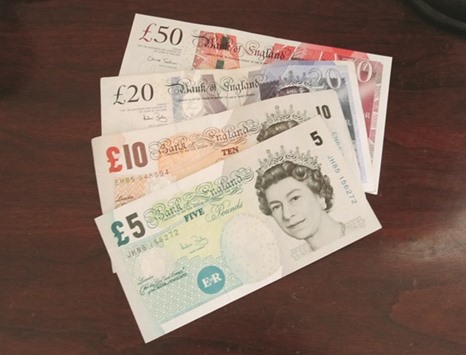Sterling fell to a 15-month low against a basket of currencies yesterday, diving almost 3% against the safe-haven yen, as nervous investors fretted about global growth and were pricing in a chance of an interest rate cut in Britain.
British 10-year gilt yields slid to a record low of 1.2520%, down 16 basis points on the day. The 10-year gilt yield has fallen some 70 basis points so far this year, and more than 30 basis points this week alone.
Interest rate markets are not pricing in a Bank of England (BoE) rate hike until 2020. Sterling overnight interbank average rates – the very short-term interest rates which form the basis of lending costs to the economy – are pricing in the chance of a hike in five years’ time.
In fact, some in the money market are factoring in a good chance of a rate cut in the coming months, something that is likely to push the currency lower, traders said. The BoE’s official bank rate has stood at 0.5% since March 2009.
Sterling was down 0.9% against the dollar at $1.4391, while the euro was up 1.3% at a 13-month high of 78.73 pence. All of which saw the sterling index drop to 86.5, its lowest since November 2014.
“Effectively, there is no prospect of a rate hike in the market any more, as far as the front-end is concerned,” said John Wraith, rates strategist at UBS. “There is now a nearly 50% chance of a cut over the next year or so priced in.”
Also weighing on sterling were falling bank stocks in Europe and the UK. Britain’s huge banking and financial sector helps in plugging the country’s current account gap, and any risks to the sector weigh on the pound, traders said.
“There is risk-off sentiment and sterling right now is being treated as a risky asset,” Rabobank currency strategist Jane Foley said. Sterling dropped below 160 yen for the first time since November 2013, and was down almost 3% at one point. It was last down 2% at 161.30 yen. In times of economic stress, countries or regions running current account surpluses – such as Japan, the eurozone and Switzerland – are seen as safer compared with those that have deficits and rely on foreign capital to finance the gap.
Britain and the US fall into the latter category.
The pound has shed around 10% against the single currency over the last two months amid worries about the possibility that a coming referendum on Britain’s EU membership could lead to a so-called “Brexit”.
Rabobank’s Foley said a Brussels summit at the end of next week, at which Prime Minister David Cameron will try to complete negotiations on a reform package to keep Britain in the EU, would be key for sterling. If the referendum is set for June, she said, the currency would be in for a turbulent few months.
The cost of protecting against big swings in sterling’s exchange rate against the dollar over the coming week jumped to an 8-month high of 12.1% yesterday. The summit will take place next Thursday and Friday.

Sterling dropped below 160 yen yesterday for the first time since November 2013, and was down 3% at one point.
